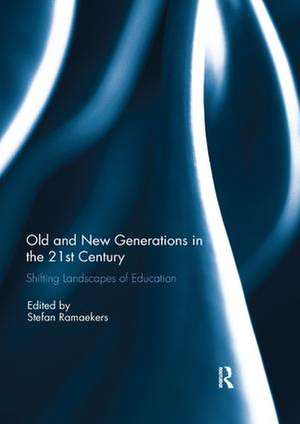Old and New Generations in the 21st Century: Shifting Landscapes of Education
Editat de Stefan Ramaekersen Limba Engleză Paperback – 27 sep 2018
The contributions in this book – originally presented during the 14th conference of the International Network of Philosophers of Education – address a broad range of philosophical issues related to the question of the educational relationship between generations today. The philosophical analysis offered by the authors in this volume creates openings, not only for other philosophers of education, but also for policy makers and practitioners. They serve as invitations, not only for further thinking but also for reconsidering educational practices; and most importantly, they generate new questions, for both today’s and tomorrow’s generations. This book was originally published as a special issue of Ethics and Education.
| Toate formatele și edițiile | Preț | Express |
|---|---|---|
| Paperback (1) | 289.16 lei 6-8 săpt. | |
| Taylor & Francis – 27 sep 2018 | 289.16 lei 6-8 săpt. | |
| Hardback (1) | 763.39 lei 6-8 săpt. | |
| Taylor & Francis – 28 feb 2017 | 763.39 lei 6-8 săpt. |
Preț: 289.16 lei
Preț vechi: 347.18 lei
-17% Nou
Puncte Express: 434
Preț estimativ în valută:
55.35€ • 60.14$ • 46.52£
55.35€ • 60.14$ • 46.52£
Carte tipărită la comandă
Livrare economică 19 aprilie-03 mai
Preluare comenzi: 021 569.72.76
Specificații
ISBN-13: 9780367133474
ISBN-10: 0367133474
Pagini: 144
Dimensiuni: 174 x 246 mm
Greutate: 0.27 kg
Ediția:1
Editura: Taylor & Francis
Colecția Routledge
Locul publicării:Oxford, United Kingdom
ISBN-10: 0367133474
Pagini: 144
Dimensiuni: 174 x 246 mm
Greutate: 0.27 kg
Ediția:1
Editura: Taylor & Francis
Colecția Routledge
Locul publicării:Oxford, United Kingdom
Public țintă
Postgraduate, Professional, and UndergraduateCuprins
Introduction: Old and new generations in the 21st century: shifting landscapes of education 1. The authority of Bildung: educational practices in early childhood education 2. On (philosophical) suffering and not knowing one’s way about (yet) in educational philosophy: Reply to Christiane Thompson 3. Postliberal education 4. Transition to parenthood and intergenerational relationships: the ethical value of family memory 5. Exhausting the fatigue university: in search of a biopolitics of research 6. Epistemic empathy in childrearing and education 7. For the sake of peace: maintaining the resonance of peace and education 8. Education in times of fast learning: the future of the school 9. Taking a chance: education for aesthetic judgment and the criticism of culture 10. Character education and the disappearance of the political 11. Formal criteria for the concept of human flourishing: the first step in defending flourishing as an ideal aim of education
Notă biografică
Stefan Ramaekers is an Associate Professor and the Head of the Laboratory for Education and Society (Research Group Education, Culture and Society), at KU Leuven, Belgium. His recent research has mainly focused on a critical investigation of the discourse of ‘parenting’ and the parent–child relationship, and on the ‘pedagogical’ significance of educational support. Recently, he has started collaborating with Dr. Naomi Hodgson on researching figurations of ‘parenting’ in cultural representations, such as film.
Descriere
This book addresses a broad range of philosophical issues related to the question of the educational relationship between generations today. The philosophical analysis offered by the authors in this volume creates openings, not only for other philosophers of education, but also for policy makers and practitioners. They serve as invitations, not only for further thinking but also for reconsidering educational practices; and most importantly, they generate new questions, for both today’s and tomorrow’s generations. This book was originally published as a special issue of Ethics and Education.
